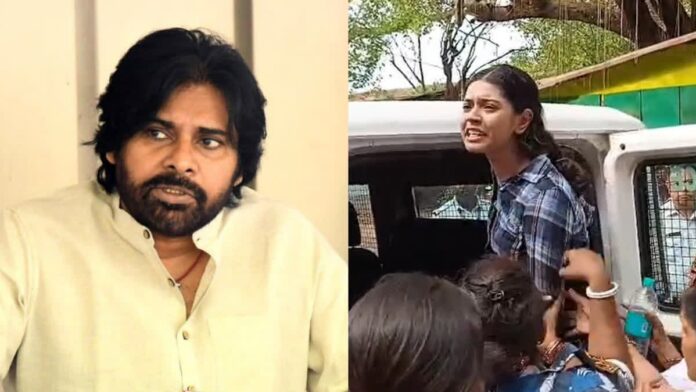Free Speech or Selective Secularism? Sharmista Panoli’s Arrest Sparks National Debate
Qalam Times News Network | Kolkata | June 1, 2025
A storm of political controversy has erupted following the arrest of social media influencer and law student Sharmista Panoli by the Kolkata Police over an allegedly communal video she posted online. The 22-year-old student was taken into custody under various sections of the Bharatiya Nyaya Sanhita (BNS) after a complaint was registered in the city. Her arrest has triggered a sharp divide across party lines, raising questions about the equal application of secular principles and the boundaries of freedom of expression.
Sharmista Panoli, who had shared videos containing abusive and communally sensitive language in the wake of Operation Sindoor — India’s retaliatory strike following the Pahalgam terror attack that claimed 26 lives — was accused of targeting certain Bollywood celebrities for their silence. The Kolkata Police acted on a First Information Report (FIR) that charged her under BNS provisions related to promoting religious enmity, deliberate insult to religious sentiments, and incitement to disturb public peace.
Following her arrest from Gurgaon, the young law student was produced before a local court, which remanded her to 14 days of judicial custody. The police maintained that she had been evading their notices, prompting them to seek a warrant from a competent court.
In a detailed clarification posted on social media, the Kolkata Police countered the growing criticism by stating that the arrest followed all legal procedures and that misleading narratives about the student being ‘unlawfully detained’ were incorrect. “Multiple attempts were made to serve legal notices to her, but she was not traceable. A warrant was issued by a court and she was arrested from Gurgaon lawfully. Transit remand was granted as per legal norms,” said the police.
However, the arrest has fueled a political firestorm, especially after Pawan Kalyan, the newly appointed Deputy Chief Minister of Andhra Pradesh and leader of Jana Sena Party — a BJP ally — strongly condemned the action. In a post on X (formerly Twitter), he stated, “Yes, her words were regrettable. But she admitted her mistake, deleted the video, and apologized. Even so, the authorities acted swiftly. Then why the silence when elected MPs insult Sanatana Dharma or when terms like ‘Ganda Dharma’ are used? Where is the justice then?”
His remarks appeared to be a direct response to West Bengal Chief Minister Mamata Banerjee, who, while criticizing the BJP, had accused it of fanning communal tensions. In one of her recent public addresses, she described the BJP’s brand of politics as “ganda dharma,” a comment that has since been widely shared and criticized.
Responding to the Chief Minister’s comments, Pawan Kalyan reiterated the importance of equal treatment under secular principles. “Blasphemy, no matter who commits it, must be condemned. Secularism cannot be a sword for some and a shield for others. Justice must be even-handed,” he wrote.
The controversy further deepened as Suvendu Adhikari, Leader of the Opposition in West Bengal Assembly and a senior BJP leader, joined the chorus of dissent. Sharing Kalyan’s post, Adhikari questioned the police’s selective action. “Where is this urgency when Hindu processions like Ramnavami or Hanuman Jayanti face violent attacks? When temples are vandalized, where is this promptness? Why does the law remain silent?” he asked.
Panoli’s original post, which reportedly sparked outrage for its communal overtones, was deleted shortly after it began circulating widely. The law student later issued an apology, acknowledging the hurt her remarks may have caused. Despite her public regret, legal proceedings moved forward, culminating in her arrest days later.
On social media, reactions remain divided. While some have backed the police action citing the need to curb hate speech, others believe it reflects a growing intolerance toward dissent, especially when the comments come from those critical of dominant political narratives. The issue has also reignited a broader debate around the limits of expression in a democratic society and whether state action against individuals is consistent across all communities and ideologies.
Legal experts observing the case have underlined that while hate speech must be checked, the differential application of laws could set troubling precedents. “You cannot afford to appear partisan in the implementation of law. Once there’s a perception that some are punished while others are shielded for similar offenses, it undermines public trust in both the judiciary and the executive,” said a retired High Court judge who preferred to remain unnamed.
In defense, the Trinamool Congress has stated that no individual — regardless of political or religious affiliation — should be allowed to disturb communal harmony, and the law will take its course. A senior TMC leader, speaking off the record, said, “This is not about religion or politics. It’s about maintaining peace in a sensitive environment.”
As the nation continues to mourn the victims of the Pahalgam terror attack, Operation Sindoor has reignited not just military and strategic conversations, but also social and political ones. In this fragile atmosphere, the words of political leaders and influencers carry immense weight.
While Sharmista Panoli remains in judicial custody, her arrest has inadvertently become a touchpoint for a deeper national conversation — one that questions whether secularism in India is truly balanced, and if freedom of speech is being shaped increasingly by political winds.
Whether this leads to legislative introspection or further polarization remains to be seen. For now, one thing is clear: the debate is far from over.







